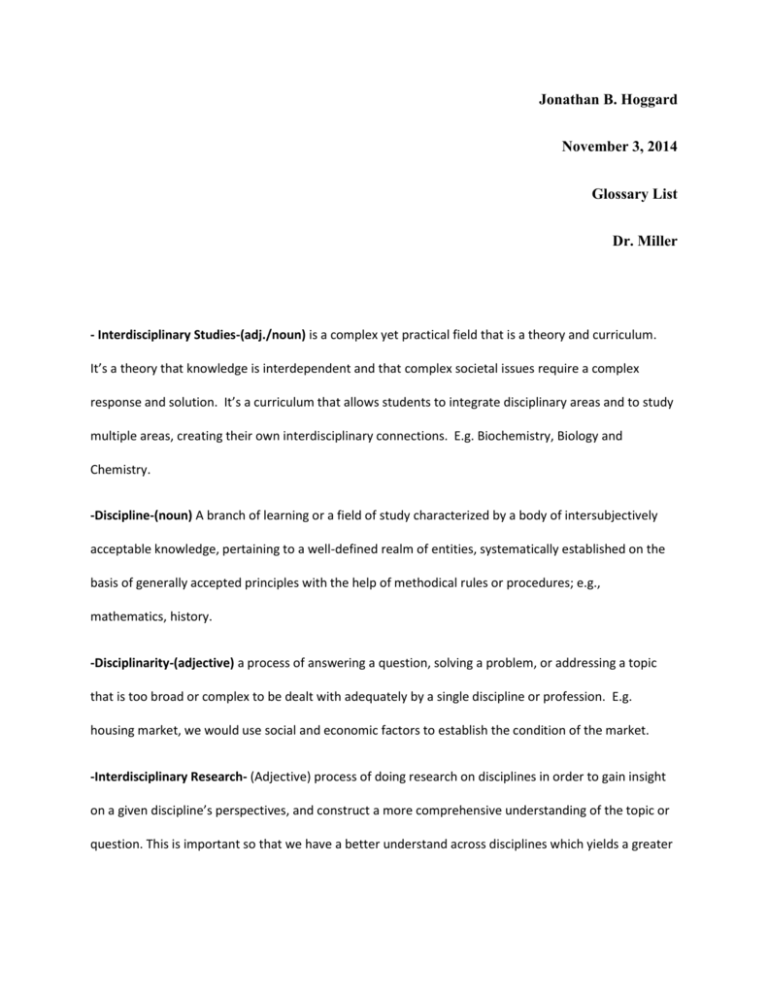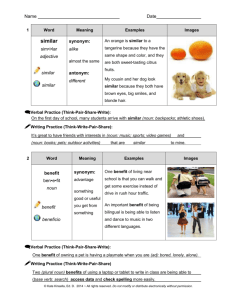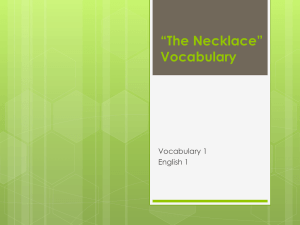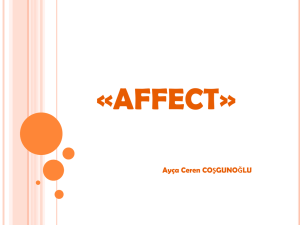File - Jonathan B. Hoggard
advertisement

Jonathan B. Hoggard November 3, 2014 Glossary List Dr. Miller - Interdisciplinary Studies-(adj./noun) is a complex yet practical field that is a theory and curriculum. It’s a theory that knowledge is interdependent and that complex societal issues require a complex response and solution. It’s a curriculum that allows students to integrate disciplinary areas and to study multiple areas, creating their own interdisciplinary connections. E.g. Biochemistry, Biology and Chemistry. -Discipline-(noun) A branch of learning or a field of study characterized by a body of intersubjectively acceptable knowledge, pertaining to a well-defined realm of entities, systematically established on the basis of generally accepted principles with the help of methodical rules or procedures; e.g., mathematics, history. -Disciplinarity-(adjective) a process of answering a question, solving a problem, or addressing a topic that is too broad or complex to be dealt with adequately by a single discipline or profession. E.g. housing market, we would use social and economic factors to establish the condition of the market. -Interdisciplinary Research- (Adjective) process of doing research on disciplines in order to gain insight on a given discipline’s perspectives, and construct a more comprehensive understanding of the topic or question. This is important so that we have a better understand across disciplines which yields a greater solution. E.g. researching biology and mechanics to better understand what makes something biomechanical. -Interdisciplinary Learning-(Adjective) the ability to learn across disciplines. It involves putting elements together, integrating them, to produce something that is new coherent, and whole. To be able to comprehend perspectives from several disciplines, and use them astutely to solve a problem. -Multidisciplinary-(Adjective) involving two or more disciplines but not integrating. E.g., studying Greek, English, and mathematics simultaneously or successively. -Cross disciplinary (Adjective) study of problems and issues that cannot be properly defined and solved within the boundaries of any given discipline. E.g. “big bang theory” -Intradisciplinary- (NOUN) study of or within only one discipline. E.g. contemporary art. -Metaphor-(NOUN) a word or phrase for one thing that is used to refer to another thing in order to show or suggest that they are similar. Also an object, activity, or idea used as a symbol of something else. E.g. “He was drowning in paperwork” -Bloom’s taxonomy- is a classification of learning objectives within education proposed in 1956 by a committee of educators chaired by Benjamin Bloom. It divides educational objectives into three “domains” Cognitive, Affective, and Psychomotor. -Integration- (Noun) The cognitive process of critically evaluating disciplinary insights and creating common ground among them to construct a more comprehensive understanding. To make something a part of another larger thing; e.g., the integration of art with technology. -Epistemology-(noun) is the branch of philosophy concerned with the nature and scope of knowledge. It looks at the necessary, sufficient conditions of knowledge, its sources, structures and limits. -Concept-(Noun ) Abstract ideas generalized from particular instances or symbols expressed in language that represent a phenomena. Concepts allow us to organize our disciplines to try and find a common ground. E.g. using a concept map to truly understand interdisciplinary studies. -Method-(Noun) a particular procedure or techniques used by a disciplines practitioner to conduct, organize, and present research. E.g., the scientific method. -Methodology- (Noun) a set of methods, rules, or ideas that is important in a science or art; a particular procedure or set of procedures. E.g. Newton’s Law. -Theory- (Noun) explains something-a general or universal phenomenon, usually by identifying relationships among concepts. Theories are not hypotheses. E.g. mathematics and chemistry use numbers to formulate data. -Curriculum-(Noun) made up of subjects taught or elements of a subject taught at an educational institution. INT as a curriculum is made up of subjects that are integrated by students to further enhance our knowledge on a particular area or to be used in a specific field. -Perspective-(Noun) a way of thinking about and understanding something (such as a particular issue or life in general), the angle or direction that a person uses to look at an object, which develops a more comprehensive understanding of it. E.g. my perspective is that trucks are better than cars. -Insight-(Noun) provides clear and intuitive perspective into a complex subject; an insight includes research-based evidence and assists in understanding situations, problems, etc.. Insights may be found in books, articles, or in papers. -Ideas-(Noun) are thoughts, plans, or suggestions about what to do. An opinion or belief; something that you imagine or picture in your mind; an understanding of something; the central meaning or purpose of something. E.g. believing this class will make me a better student. -Philosophy-(Noun) the study of ideas about knowledge, truth, the nature and meaning of life, etc..; a particular set of ideas about knowledge, truth, the nature and meaning of life; a set of ideas about how to do something or how to live. E.g. a person’s philosophy maybe to treat others how they would want to be treated. -Association for Integrative Studies- now called the Association for Interdisciplinary Studies is an interdisciplinary professional organization that promotes the interchange of ideas among scholars and administrators in all of the arts and sciences on intellectual and organizational issues related to furthering integrative studies. Incorporated as a non-profit educational association in the State of Ohio, it has an international membership. -Knowledge-(Noun) information, understanding, or skill that you get from experience or education; awareness of something: the state of being aware of something. E.g. learning the definition to INT is gaining knowledge. -Knowledge formation- how knowledge is formulated, how knowledge is created. E.g. concept maps. -Knowledge construction- Knowledge is contextual. It does not happen all at once, but builds upon is shaped by what we already know. E.g. concept maps. -Social Science Research Council (SSRC) - the world’s first national organization of all the social sciences, from the onset it’s goal has been to improve the quality of and the infrastructure for, research in the social sciences. -Heuristic-(Adjective) experienced-based techniques for problem solving, learning, and discovery that gives a solution which is not guaranteed to be optimal. Used to speed up the process of finding a satisfactory solution via mental shortcuts to ease the cognitive load of making a decision. -Ethnocentrism- (Noun) limits our ability to think critically about other people’s way of doing things. It refers to the tendency to judge other cultures as inferior to one’s own, especially because of either a superiority complex or ignorance. E.g. stereotypes. -Boundary crossing- the process or act of going above and beyond the limits of one discipline and incorporating it into another. E.g. using computers to formulate scientific data. -Domain-(Noun) a territory over which dominion is exercised; a sphere of knowledge, influence, or activity; the set of elements to which a mathematical or logical variable is limited. E.g. geometry in math. -Knowledge domains- knowledge of the set of elements to which a mathematical or logical variable is limited. E.g. mathematic equation. -Mode(s) of thinking- the many different ways that one approaches or thinks about problems, ideas, events, etc... E.g. historicism, philistinism, critical thinking etc. -Critical Thinking-(Noun) The capacity to analyze, critique, and asses. This is a way of deciding whether a claim is always true, sometimes true, partly true, or false. It is an important component of most professions. E.g. researching whether or not caffeine is good for your body. -Hegemony-(Noun) is an indirect form of government, and imperial dominance in which the leader state rules geopolitically subordinate states by the implied means of power, the threat of force. Also the social, cultural, ideological, or economic influence exerted by a dominant group. E.g. president. -Dogmatic-(Adjective) Characterized by or given to the expression of opinions very strongly or positively as if they were facts. E.g. stating that football is the best sport ever. -Holistic-(Adjective) relating to or concerned with wholes or with complete systems rather than with the analysis of, treatment of, or dissection into parts… e.g. holistic ecology views humans and the environment as a single system. -Dichotomy-(Noun) a division into two especially mutually exclusive or contradictory groups or entities e.g.; the dichotomy between theory and practice. Also, the process or practice of making such a division of the population into two opposed classes. -Dialectic- (Adjective) Logic; discussion and reasoning by dialogue as a method of intellectual investigation; specifically: the Socratic techniques of exposing false beliefs and eliciting truth. E.g. debating issues or problems in a discipline. -Iterative-(Adjective) involving repetition: as: expressing repetition of a verbal action. E.g. driving home the idea that being a critical thinker is important. -Heuristic-(adjective) is the process of enabling a person to discover or learn something for themselves. -Recursive-(Adjective) of, relating to, or constituting a procedure that can repeat itself indefinitely. Example a recursive rule in a grammar or a recursive function in a computer program. -Communication-(Noun) a process by which information is exchanged between individuals through a common system of symbols, signs, or behaviors. E.g.; body language, sign language spoken word -Polemical-(Noun) of, relating to, or being polemic: Controversial. Example in the middle Ages theologians could be surprisingly polemical in their writings. -Idea dominance- an idea that governs all one’s actions and thoughts. E.g. stereotypes that aren’t investigated to find the truths/false in them. -Scope-(Noun) refers to the parameters of what is included or excluded from the study. The space or opportunity for unhampered motion, activity, or thought: to look at especially for the purpose of evaluation. E.g. narrowing of mathematics down to the studying of Algebra. -Discourse-(Noun) the capacity of orderly thought or procedure: RATIONALITY. A mode of organizing knowledge, ideas, or experience, that is rooted in language and its concrete contexts. E.g. Connected speech or writing, -Disciplinary assumptions- every discipline inculcates its own assumptions and world views. For example, sociology has very different beliefs and views about poverty than economics. Sociology sees poverty has the result of societal factors, while economics will see poverty as the result of market factors or mismanagement.









